#china border tension
Explore tagged Tumblr posts
Text
India US China Relations: New Game Plan
Navigating the New Great Game: India-US-China Relations and New Delhi’s Strategic Horizon The Shifting Global Chessboard: US-China Tensions and the Indo-Pacific Fulcrum The 21st century is increasingly defined by the complex and often contentious relationship between the United States and China. This rivalry is not just a simple bilateral issue. It is redrawing the geopolitical map. The…
#Aksai Chin#Belt and Road Initiative#China India Border#China Military Expansion#geopolitics#Himalayan Geopolitics#India Foreign Policy#India US China Relations#Indo-Pacific Strategy#international relations#newspatron#Quad Alliance#Strategic Autonomy India#US China Tensions
0 notes
Text
China-India Relations Update
Keeping You in the Loop May 15, 2025 Tensions between China and India remain high today, particularly concerning the northeastern Indian state of Arunachal Pradesh (Ministry of External Affairs, 2025). China recently renamed several locations within the region as part of its ongoing territorial claim over what it calls “South Tibet” (Global Times, 2025). India has responded firmly, reaffirming…
#Arunachal Pradesh#border disputes#China India relations#China renaming controversy#diplomatic tensions#India foreign policy#Line of Actual Control#regional security#South Asia geopolitics#trade with China
0 notes
Text
india-steps-up-diplomatic-against-pakistan-pahalgam-attack-unsc-imf
IMF, FATF से UNSC तक, पाकिस्तान के खिलाफ दुनिया को लामबंद कर रहा भारत

भारत ने अंतरराष्ट्रीय मंचों पर पाकिस्तान के खिलाफ कदम उठाना शुरू कर दिया है. भारत संयुक्त राष्ट्र सुरक्षा परिषद (UNSC) में पाकिस्तान को घेरने की तैयारी में है. पाकिस्तान को चीन का समर्थन मिल रहा है, भारत की तैयारी है कि वैश्विक मंच पर चीन के इस सहयोग के खिलाफ भी आवाज उठाई जाए. भारत इंटरनेशनल मॉनेटरी फंड (IMF) में भी चीन के ��िलाफ आवाज उठाई है.
भारत ने IMF से पाकिस्तान को दिए जाने वाले कर्ज की समीक्षा करने की मांग की है. यह कदम पिछले हफ्ते पहलगाम में हुए आतंकी हमले के बाद उठाए गए हैं, जिसमें 26 लोग मारे गए थे. 22 अप्रैल को हुए इस हमले में 25 पर्यटक मारे गए. दावा किया गया कि आतंकियों ने पर्यटकों को धर्म पूछकर मौत के घाट उतारा. भारत का कहना है कि ऐसा आतंकियों ने सामाजिक सौहार्द बिगाड़ने के लिए किया.
पूरा आर्टिकल नीचे लिंक पर क्लिक कर पढ़ें👇
IMF, FATF से UNSC तक, पाकिस्तान के खिलाफ दुनिया को लामबंद कर रहा भारत
#Pahalgam terror attack#India-Pakistan tensions#UN Security Council#IMF loan review#cross-border terrorism#Financial Action Task Force#Lashkar-e-Taiba#The Resistance Front#Jammu and Kashmir#S Jaishankar#JD Vance#China UNSC veto#Indus Waters Treaty#Pakistan grey list#global fight against terrorism#पहलगाम आतंकी हमला#FATF#LeT#TRF#लश्कर-ए-तैयबा#टीआरएफ#जम्मू-कश्मीर#बैसरन घाटी
0 notes
Text
भारत-चीन वार्ता: LAC तनाव कम करने से लेकर कैलाश मानसरोवर यात्रा तक, बीजिंग में हुई बड़ी बैठक #News #BreakingNews #LatestNews #CurrentNews #HindiNews
#bilateral relations#border tensions#Direct flights#Donald Trump tariff war#India-China talks#Kailash Mansarovar Yatra#LAC situation#trans-border rivers#Vikram Misri#WMCC meeting
0 notes
Text
Indian Army Resumes Patrolling in Eastern Ladakh's Demchok
India-China Border News: New Delhi, November 1, 2024, – The Indian Army has resumed patrolling activities in the strategically important Demchok sector of Eastern Ladakh. This development comes days after India and China successfully completed disengagement at two friction points in the region: Demchok and Depsang Plains. The disengagement process, which concluded earlier this week, marked a…
#Demchok and Depsang#Eastern Ladakh#India Chiana Border Tension#India China Disengagement News#India-China border dispute#Indian Army#PLA
0 notes
Text
India-China Agreement: Key Details on LAC Patrolling and Disengagement
India and China have recently finalized an agreement on patrolling arrangements along the Line of Actual Control (LAC), marking a significant development after a prolonged military standoff in Eastern Ladakh that began in 2020. This breakthrough follows extensive diplomatic and military discussions between the two nations.

Overview of the Agreement
Defence sources revealed to CNN-News18 that the agreement specifically addresses friction points in Depsang, Demchok, and other regions where disengagement has already been initiated. “In recent weeks, Indian and Chinese negotiators have maintained close communication across various platforms. As a result, we have reached an agreement on patrolling arrangements along the LAC, facilitating disengagement and resolving the issues that emerged in 2020,” stated Foreign Secretary Vikram Misri during a press conference on Monday.
While the Ministry of External Affairs has not detailed the specific mechanisms of the agreement, defence officials confirmed it was the result of multiple meetings between diplomats from both sides, with significant involvement from their military counterparts. The discussions included Corps Commanders level talks held in February and consultations within the Working Mechanism for Consultation & Coordination on India-China Border Affairs (WMCC) in August.
Details of Patrolling Arrangements
A senior Ministry of Defence source explained, “Both countries have reached an agreement regarding patrolling, primarily focusing on Depsang and Demchok, which contain over five patrol points. However, the agreement is not restricted to these two areas.” Positive progress is underway, and further plans may emerge following a potential meeting between Prime Minister Narendra Modi and Chinese President Xi Jinping during the BRICS summit.
Disengagement at the Finger Area and Galwan's PP14 occurred two years ago, followed by similar actions at Gogra’s PP17 and Hot Spring’s PP15. Despite these developments, patrolling had remained suspended at these locations. Sources indicate that patrols are set to resume soon at these points, where buffer zones have already been established.
Future Steps and Implications
The implementation of this agreement is still in progress, and further details are anticipated. A defence officer commented, “While immediate troop pullbacks are not expected, the situation is likely to improve over time.” The ongoing collaboration between both sides signifies a mutual commitment to address and resolve border issues, paving the way for a more stable relationship in the future.
In summary, this agreement represents a significant step toward reducing tensions along the LAC and enhancing cooperation between India and China in managing their border disputes.
0 notes
Text
India and China Agree on Disengagement and Patrolling Arrangements Along LAC: A Step Towards Border Stability
India and China Agree on Disengagement and Patrolling Arrangements Along LAC: A Step Towards Border Stability In a significant development in India-China relations, the two nations have reached an agreement to disengage their troops and establish new patrolling arrangements along the Line of Actual Control (LAC). This decision, announced by India’s Foreign Secretary Vikram Misri, marks a crucial…
#Asian Geopolitics#Border Tensions#Demchok Dispute#Depsang Plains Issue#Diplomatic Negotiations#Eastern Ladakh Conflict#Galwan Valley Clash#India and China Agree on Disengagement#India-China Border Dispute#India-China Relations#Line of Actual Control (LAC)#Military Disengagement#Pangong Tso Standoff#Peace Talks#S. Jaishankar#Sino-Indian Dialogue#Vikram Misri
0 notes
Text
India-China border Clashes Tension: क्या फिर से पूर्वी लद्दाख में भारत और चीन के सैनिक LAC पर भिड़े? सामने आई सच्चाई
India-China border Clashes Tension: काफी समय से सीमा विवाद को लेकर भारत और चीन के बीच विवाद होते रहते हैं. साल 2020 के दौरान पूर्वी लद्दाख में दोनों देशों की सेना अब आमने-सामने आ चुकी है. ऐसे में पूर्वी लद्दाख की गलवान घाटी में दोनों देशों की सेनाओं के बीच झड़प भी हुई थी.

#India-China border Clashes Tension#India-China border Clashes#India-China border#India-China#India#China#India Border#China Border#news
0 notes
Text
There has been major developments in the region in the past few days that indicates regional war is imminent. Again the tweets and articles will be in chronological order.
American war ships are in the Mediterranean and Red Seas. Russia responded to that by sending planes to the Black Sea and China by sending warships to Kuwait.
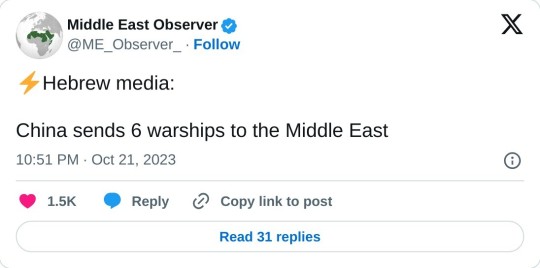
We got our usual back and forth on the ground operation in Gaza
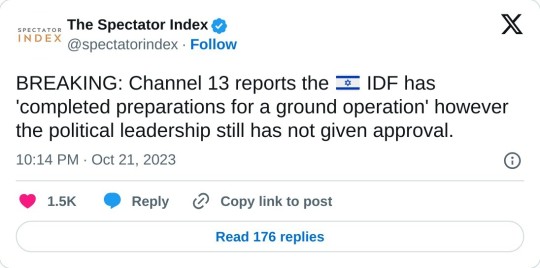


The American media is not really reporting these recent attacks on their military bases. In fact, the military is downplaying the strength of the responses by Yemeni and Syrian groups to the Gaza genocide. This is either because they want to avoid regional war or because they want to be better prepared for regional war.
This statement below seems to indicate that Iran is coming to the conclusion that open warfare is the only thing that will deter America and Israel

As for Yemen, they've declared Israeli ships will be targeted if the attack on Gaza continues (you'll see later that this is no empty threat)
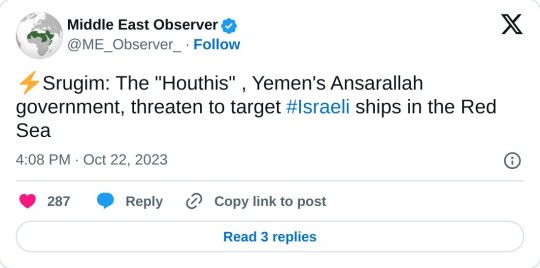
By the way, Israel bombed an Egyptian military site along the border and claimed it was an accident. The Egyptian people have been calling for their government to intervene militarily and I don't think this will ease the pressure.
On the 22nd, Israel sent a small team to infiltrate Gaza. They didn't get very far

They're also struggling against Hezbollah

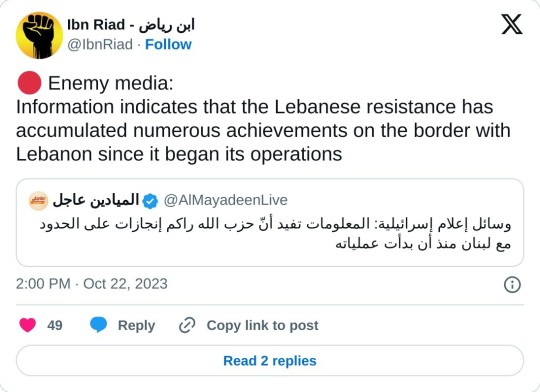
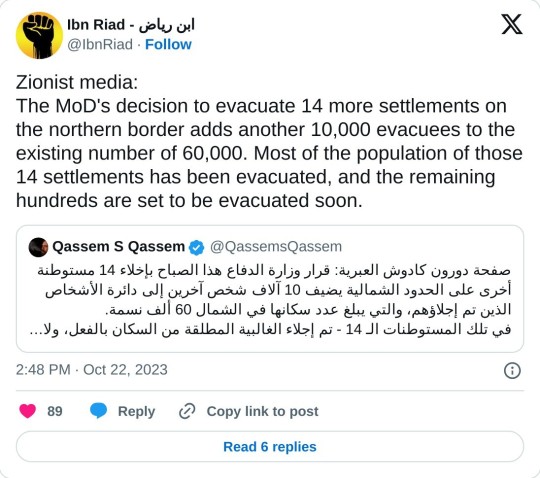
This meeting by the Russian foreign minister is a big deal as you'll see later
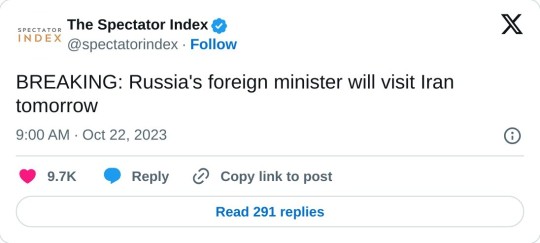
America responds to the escalating tension by deploying 'defensive systems' all over West Asia. It risks stretching itself too thin as multiple countries are already involved in the Palestian resistance with countries like Egypt and Jordan facing internal pressure to do something about the Gazan genocide
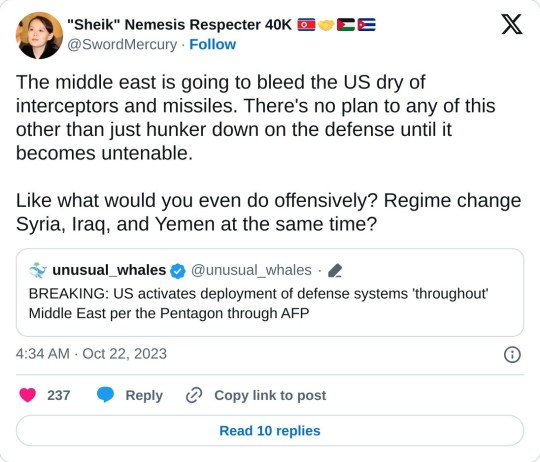
Republican Mitch McConnell has recently called Iran, Russia and China 'the new axis of evil'. It seems this is the new angle that the West has chosen because Rishi Sunak has also been comparing Hamas to Russia. This can only lead to Russia getting close to Iran which would ultimately help Hamas.

The situation in Iraq continues to deteriorate as America evacuates its embassy and warns its citizens not to use the Baghdad International Airport due to attacks by Iraqi military groups.
Here we have an Israeli commander admitting that Israel is largely on the defensive against Hezbollah and their soldiers are both traumatised and disheartened. Remember, Hezbollah has yet to officially enter the war
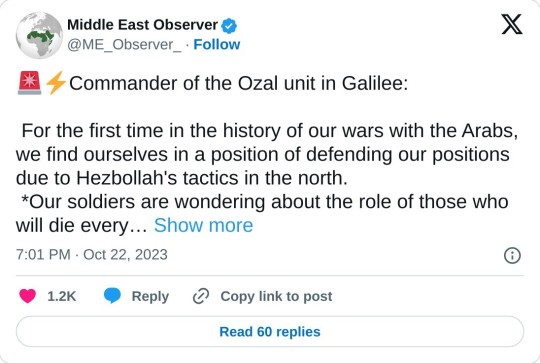
Blinken said that the US 'will be prepared' if Iran escalates its attacks which gives weight to that idea that the US is only trying to deescalate because its not ready yet.
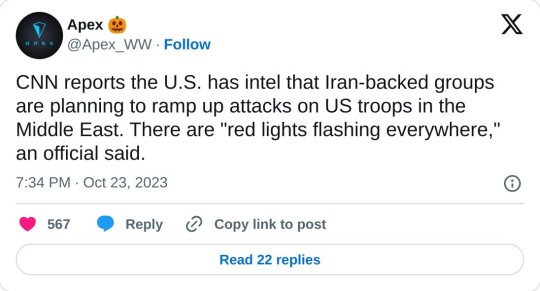
A few hours ago, American bases in Syria were targeted. It's becoming clear that a major goal in the plan to defeat Israel is removing America from the picture in the region

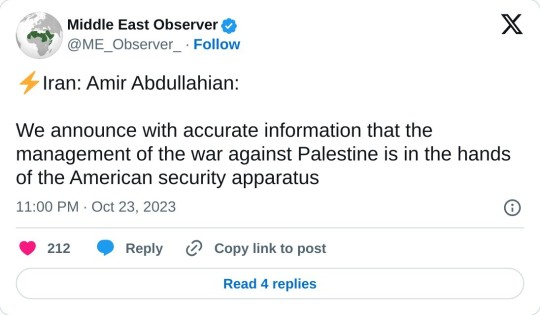
The White House then blames Iran for the attack
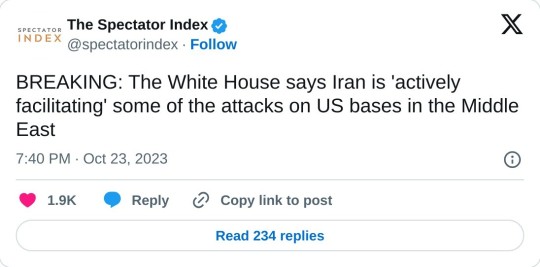
More military bases targeted in Iraq

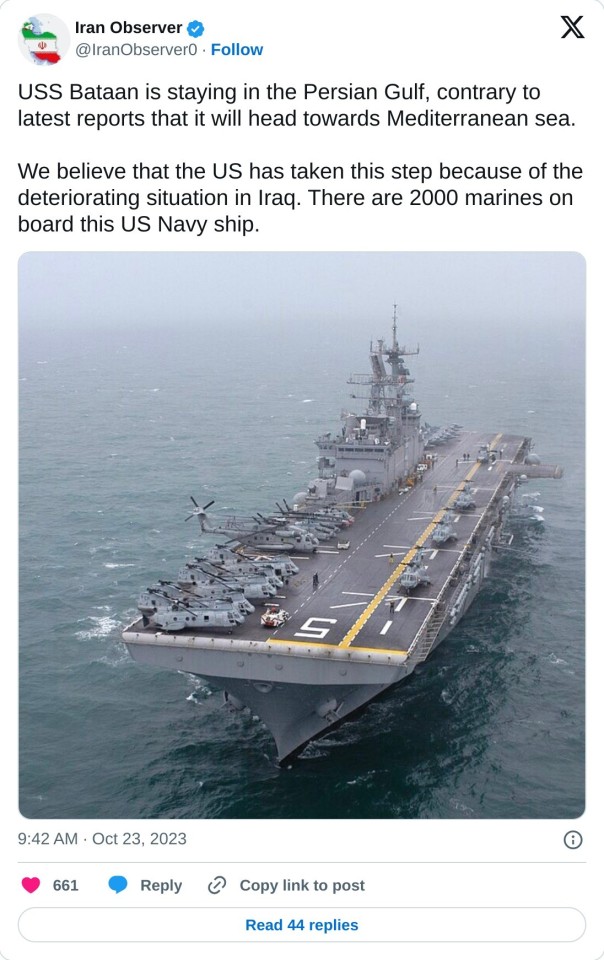

Meanwhile IDF is trying to infiltrate Gaza again. Reminder that a ground operation means that Hezbollah will officially enter the war and begun using its vast numbers of missiles and rockets. They're also attacking the West Bank, the resistance fighters have ambushed them

Yemen follows through on the threats it made by attacking a US warship with drones
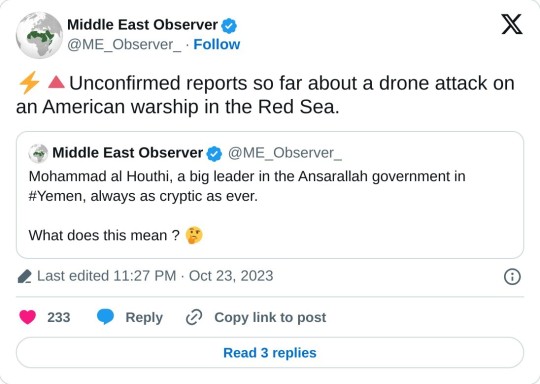

Ansarullah claims there was a direct hit but the US Navy says that all drones were intercepted (using days old pictures).
So what now? First, do not expect a ceasefire. Tbh the Palestinian resistance hasn't even called for ceasefire, just an exchange of hostages.
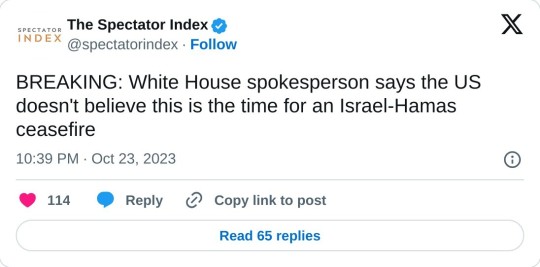
Second of all, America itself does not believe that Israel can win this war so let's all stop acting like Palestine has already lost
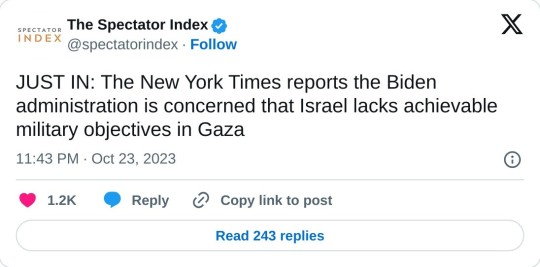
Thirdly, regional war is looking more and more like reality
1K notes
·
View notes
Text
[Hanfu · 漢服]The relationship between women in history is not just love rivals,
“but also thousands of years later, everyone knows that it is me and you.”
Let's get to know about them/她们 in China history.
1.【Han Dynasty】:Princess Jieyou (解忧公主) & Feng Liao (馮嫽)
Princess Jieyou (Chinese: 解忧公主; 121 BC – 49 BC), born Liu Jieyou (Chinese: 刘解忧), was a Chinese princess sent to marry the leader of the Wusun kingdom as part of the Western Han Chinese policy of heqin(和亲).
As the granddaughter of the disgraced Prince Liu Wu (劉戊) who had taken part in the disastrous Rebellion of the Seven States,her status was low enough that she was sent to replace Princess Liu Xijun (劉細君) after her untimely death and marry the Wusun king Cunzhou (岑陬).
Jieyou lived among the Wusun for fifty years and did much work to foster relations between the surrounding kingdoms and the Han. She was particularly reliant upon her attendant, Feng Liao, whom she dispatched as an emissary to Wusun kingdoms and even to the Han Court. She faced opposition from pro-Xiongnu members of the Wusun royalty, particularly Wengguimi’s Xiongnu wife. When word came that the Xiongnu planned to attack Wusun, she convinced her husband to send for aid from the Han Emperor. Emperor Wu of Han sent 150,000 cavalrymen to support the Wusun forces and drive back the Xiongnu.
In 51 BCE at the age of 70, Jieyou asked to be allowed to retire and return to the Han. Emperor Xuan of Han agreed and had her escorted back to Chang'an where she was welcomed with honor. She was given a grand palace with servants usually reserved for princesses of the imperial family. In 49 BCE, Jieyou died peacefully.
Feng Liao (馮嫽)
Feng Liao (馮嫽) was China's first official female diplomat,[citation needed] who represented the Han dynasty to Wusun (烏孫), which was in the Western Regions. It was a practice for the Imperial Court to foster alliances with the northern tribes via marriage, and two Han princesses had married Wusun kings.
Feng Liao was the maidservant of Princess Jieyou (解憂公主), who was married off to a Wusun king. Feng herself later married an influential Wusun general, whose good standing with Prince Wujiutu (烏就屠) of the kingdom later proved beneficial to the Han dynasty.
When Prince Wujiutu seized the throne of Wusun in 64 BC, after his father died, there was fear in the Imperial Court of Han that Wujiutu, whose mother was Xiongnu, would allow Wusun to become Xiongnu's vassal.
Zheng Ji, Governor of the Western Regions, recalled that Feng Liao had married into Wusun and with her familiarity of the Wusun customs, she was a prime candidate to persuade Wujiutu to ally his kingdom with Han. Wujiutu acceded and Emperor Xuan of Han (漢宣帝) sent for Feng. He praised her for her judgement and diplomacy, and appointed her as the official envoy to Wusun.
Wujiutu was conferred the title "Little King of Wusun" while his brother, the son by a Han princess, was named "Great King of Wusun". Wusun was divided between the two kings and tensions in that region were eased.
※Xiongnu: Xiongnu: A nomadic tribe that has occupied northern China for a long time. Later it gradually became a state. It harassed the borders of the Han Dynasty for a long time and robbed supplies.
------
With their efforts, the Wusun Kingdom gradually tended to support the Han Dynasty, and the Xiongnu's defeat in China also began.
------
2.【Tang Dynasty】:Shangguan Wan'er(上官婉儿)&Princess Taiping (太平公主)
Shangguan Wan'er/上官婉儿 (664 – 21 July 710) was a Chinese politician, poet, and imperial consort of the Wu Zhou and Tang dynasties. Described as a "female prime minister,"Shangguan rose from modest origins as a palace servant to become secretary and leading advisor to Empress Wu Zetian of Zhou. Under Empress Wu, Shangguan exercised responsibility for drafting imperial edicts and earned approbation for her writing style. She retained her influence as consort to Wu's son and successor, Emperor Zhongzong of Tang, holding the imperial consort rank of Zhaorong (昭容). Shangguan was also highly esteemed for her talent as a poet.Shangguan was also highly esteemed for her talent as a poet. In 710, after Emperor Zhongzong's death, Shangguan was killed during a palace coup that ended the regency of Empress Dowager Wei.
Princess Taiping (太平公主)lit. "Princess of Great Peace", personal name unknown, possibly Li Lingyue (李令月) (after 662 – 2 August 713) was a royal princess and prominent political figure of the Tang dynasty and her mother Wu Zetian's Zhou dynasty. She was the youngest daughter of Wu Zetian and Emperor Gaozong and was influential during the reigns of her mother and her elder brothers Emperor Zhongzong and Emperor Ruizong (both of whom reigned twice), particularly during Emperor Ruizong's second reign, when for three years until her death, she was the real power behind the throne.
She is the most famous and influential princess of the Tang dynasty and possibly in the whole history of China thanks to her power, ability and ambition. She was involved in political difficulties and developments during the reigns of her mother and brothers. Indeed, after the coup against Empress Dowager Wei, she became the real ruler of Tang. During the reign of Emperor Ruizong, she was not restricted by anything, the emperor issued rulings based on her views and the courtiers and the military flattered her and majority from every civil and military class joined her faction, so her power exceeded that of the emperor.
Eventually, however, a rivalry developed between her and her nephew, Emperor Ruizong's son, Crown Prince Li Longji. Both of them were hostile in power-sharing and they fought for the monopoly over power. After Emperor Ruizong yielded the throne to Li Longji (as Emperor Xuanzong) in 712, the conflict came to the political forefront, and openly, the court became a manifestation of conspiracy rather than the administration of the empire; in 713, Emperor Xuanzong, according to historical records, believing that she was planning to overthrow him, acted first, executing a large number of her powerful allies and forcing her to commit suicide.
------
The relationship between Shangguan Wan'er and Princess Taiping has always been written as "enemies" in official history, but with the phrase "千年万岁,椒花颂声", their friendship that has been buried for thousands of years was revealed.
The"千年万岁,椒花颂声" sentence comes from the epitaph written by Princess Taiping for Shangguan Wan'er. The original text is: "潇湘水断,宛委山倾,珠沉圆折,玉碎连城。甫瞻松槚,静听坟茔,千年万岁,椒花颂声”
Translation: Now that you are far away, the sky and the earth will lose their color. I'm afraid that all I can do in the future is to sit and look at the tea tree in front of your tomb. Maybe I can hear your voice again when I stand within an inch of the tomb. But this is a delusion after all, a quiet tomb, no beautiful face, a empty place of death. I hope that in a thousand or ten thousand years, there will still be people like me who remember you.
------
3.【Late Qing Dynasty】:Lü Bicheng(呂碧城) & Qiu Jin (秋瑾)

Lü Bicheng(呂碧城)also known as Alice Pichen Lee(1883–1943) was a Chinese writer, activist, newspaper editor, poet and school founder. She has been mentioned as one of the top four women in literature from the early Republic of China.
When she was four, her father retired to Lu'an, Anhui. She lived a life of comfort until the age of 12, when her father died in 1895. Because Lü Fengqi had no male heir, relatives of the Lü lineage contested for his inheritance, and Yan Shiyu and her four daughters were forced to move to Lai'an County to live with her natal family. When she was nine, Lü Bicheng was betrothed to a Wang family, but as her own family fortune declined, the Wang family broke off the marriage contract, giving the young Bicheng the stigma of a "rejected woman". The resulting emotional scar is often considered a major factor in her later decision to never marry.[8] Her widowed mother and the Lü girls were not well treated at the Yan family in rural Anhui. When Lü was 15 or 16, Yan Shiyu sent her to live with her maternal uncle Yan Langxuan (嚴朗軒), who was the salt administrator in Tanggu, the port city outside the northern metropolis of Tianjin. Her sister Huiru also joined her later.
During her stay in Tanggu, Qing China went through the tumultuous period of the failed Hundred Days' Reform of 1898, which brought about increasing awareness of women's education, and the Boxer Rebellion of 1900. In 1904, Mrs. Fang, the wife of her uncle's secretary, invited Lü Bicheng to visit a girls' school in Tianjin, but her uncle prevented her from going and severely reprimanded her. The next day, she ran away from her uncle's home, and took the train to Tianjin with no money or luggage. She wrote a letter to Mrs. Fang, who was staying at the dormitory of the Ta Kung Pao newspaper. Ying Lianzhi, the Catholic Manchu nobleman who founded the newspaper, read the letter and was so impressed by it that he made her an assistant editor. Lü Bicheng wrote a "progressive" ci that she had previously written, set to "A River Full of Red" ("Manjianghong") usually used to express heroic emotions. Ying transcribed the whole song in her diary and published it in L'impartial two days later. At the time, it was sensational for a woman to write for an influential national newspaper such as Ta Kung Pao. She was 21 years old. She used Ta Kung Pao to promote feminism and became a well-known figure.
Lü's ci poetry was published in the newspaper and it was very well received. She was the chief editor of the newspaper from 1904 to 1908. In 1904 she decided to improve education for girls. She had published her thoughts on women's rights and the general editor of the newspaper introduced her to Yan Fu who was an advocate for Western ideas. The Beiyang Women's Normal School was established that same year. At 23 Lü took on the job of principal of the school she had founded two years before. At first this school found it difficult to find girls who qualified for secondary education and students were brought in from Shanghai to make up the numbers.
Lü knew the revolutionary Qiu Jin and they had similar objectives but Lü did not join her in Japan when she was invited as she was unsure whether women should meddle in politics. She was then chosen to be secretary to Yuan Shikai, one of the most powerful people in China. When he set out to declare himself emperor of China she left, like many of his followers, and abandoned him.
--

Qiu Jin (秋瑾)8 November 1875 – 15 July 1907,was a Chinese revolutionary, feminist, and writer.Her sobriquet name is Jianhu Nüxia (Chinese: 鑑湖女俠 lit. 'Woman Knight of Mirror Lake').
Qiu was born into a wealthy family. Her grandfather worked in the Xiamen city government and was responsible for the city's defense. Zhejiang province was famous for female education, and Qiu Jin had support from her family when she was young to pursue her educational interests. Her father, Qiu Shounan, was a government official and her mother came from a distinguished literati-official family. Qiu Jin's wealthy and educated background, along with her early exposure to political ideologies were key factors in her transformation to becoming a female pioneer for the woman's liberation movement and the republican revolution in China.
In the early 1900s, Japan had started to experience western influences earlier than China. As to not fall behind, the Qing government sent many elites to learn from the Japanese. Qiu Jin was one of these elites that got the chance to study overseas. After studying in a women's school in Japan, Qiu returned to China to participate in a variety of revolutionary activities; and through her involvement with these activities, it became clear how Qiu wanted others to perceive her. Qiu called herself 'Female Knight-Errant of Jian Lake' — the role of the knight-errant, established in the Han dynasty, was a prototypically male figure known for swordsmanship, bravery, faithfulness, and self-sacrifice — and 'Vying for Heroism'
Qiu Jin had her feet bound and began writing poetry at an early age. With the support from her family, Qiu Jin also learned how to ride a horse, use a sword, and drink wine—activities that usually only men were permitted to learn at the time.In 1896 Qiu Jin got married. At the time she was only 21, which was considered late for a woman of that time. Qiu Jin's father arranged her marriage to Wang Tingchun, the youngest son of a wealthy merchant in Hunan province. Qiu Jin did not get along well with her husband, as her husband only cared about enjoying himself.While in an unhappy marriage, Qiu came into contact with new ideas. The failure of her marriage affected her decisions later on, including choosing to study in Japan.
While still in Tokyo, Qiu single-handedly edited a journal, Vernacular Journal (Baihua Bao). A number of issues were published using vernacular Chinese as a medium of revolutionary propaganda. In one issue, Qiu wrote A Respectful Proclamation to China's 200 Million Women Comrades, a manifesto within which she lamented the problems caused by bound feet and oppressive marriages. Having suffered from both ordeals herself, Qiu explained her experience in the manifesto and received an overwhelmingly sympathetic response from her readers. Also outlined in the manifesto was Qiu's belief that a better future for women lay under a Western-type government instead of the Qing government that was in power at the time. She joined forces with her cousin Xu Xilin and together they worked to unite many secret revolutionary societies to work together for the overthrow of the Qing dynasty.
Between 1905 and 1907, Qiu Jin was also writing a novel called Stones of the Jingwei Bird in traditional ballad form, a type of literature often composed by women for women audiences. The novel describes the relationship between five wealthy women who decide to flee their families and the arranged marriages awaiting them in order to study and join revolutionary activities in Tokyo. Titles for the later uncompleted chapters suggest that the women will go on to talk about “education, manufacturing, military activities, speechmaking, and direct political action, eventually overthrowing the Qing dynasty and establishing a republic” — all of which were subject matters that Qiu either participated in or advocated for.
Life after returning to China
Qiu Jin was known as an eloquent orator who spoke out for women's rights, such as the freedom to marry, freedom of education, and abolishment of the practice of foot binding. In 1906 she founded China Women's News (Zhongguo nü bao), a radical women's journal with another female poet, Xu Zihua in Shanghai. They published only two issues before it was closed by the authorities. In 1907, she became head of the Datong school in Shaoxing, ostensibly a school for sport teachers, but really intended for the military training of revolutionaries[citation needed]. While teaching in Datong school, she kept secret connection with local underground organization—The Restoration Society. This organization aimed to overthrow the Manchu government and restore Chinese rule.
Death
In 1907, Xu Xilin, Qiu’s friend and the Datong school’s co-founder was executed for attempting to assassinate his Manchu superior. In the same year, the authorities arrested Qiu at the school for girls where she was the principal. She was tortured but refused to admit her involvement in the plot. Instead the authorities used her own writings as incrimination against her and, a few days later, she was publicly beheaded in her home village, Shanyin, at the age of 31. Her last written words, her death poem, uses the literal meaning of her name, Autumn Gem, to lament of the failed revolution that she would never see take place:
秋風秋雨愁煞人 (Autumn wind, autumn rain — they make one die of sorrow)
After Qiu Jin was killed, no one dared to collect her body. Lu Bicheng endured her grief and took great risks to bury her friend. The guarding Qing army learned that the woman who came to collect the corpse was Lu Bicheng, who was famous in China, and they had no choice but to do anything.
Qiu Jin's death caused Lu Bicheng to lose a rare confidant in life. She wrote many poems in memory of Qiu Jin, recalling this like-minded friend.
Later, Lü Bicheng wrote "The Biography of the Revolutionary Heroine Qiu Jin" in English, which was published in newspapers in New York, Chicago and other places in the United States. It caused a great response and not only made many people in the world know about Qiu Jin's legendary story, but also published it in newspapers in New York and Chicago. It also makes people understand the darkness and corrupt social status quo of the Qing Dynasty. Lu Bicheng used a pen of her own to record her friendship with Qiu Jin, and also fulfilled her promise to Qiu Jin to respond with the "battle of words"
————————
📸Video & 🧚🏻 Model:@荷里寒 & @阿时Ashi_
🔗Weibo:https://weibo.com/3618951560/NEZZnpQRq
————————
#chinese hanfu#china history#woman power#woman in history#hanfu#hanfu accessories#hanfu_challenge#chinese traditional clothing#china#chinese#han dynasty#tang dynasty#late qing dynasty#feminism#revolution#漢服#汉服#中華風#girl power#hanfu girl
397 notes
·
View notes
Text

What policies Mitch? What policies were Americans unaware of? The Biden Administration's lax border enforcement? Their escalations of global tensions? Degradation of race relations? Sinking of the economy on a global scale?
Which policy enforced by the Biden Administration is going to be why Trump will be winning?
What happened Mitch? What happened four years prior? Jan 6th? Keep crying, bitch.
Trump is no felon, he tried to steal no election, and did not cry wolf, meanwhile the Biden Administration was openly corrupt, weaponized the DOJ and FBI against the GOP and Trump, and fabricated crimes to levy against Trump for four years straight.
To emphasize this;
Special counsel Jack Smith on Monday filed motions to drop all federal charges against President Donald Trump regarding his alleged mishandling of classified documents and his alleged effort to overturn the 2020 presidential election in the lead-up to the Jan. 6 tour of the U.S Capitol.
Hours later, U.S. District Judge Tanya Chutkan granted Smith's motion to dismiss the Jan. 6 indictment, thus formally bringing to an end the case that alleged Trump unlawfully conspired to overturn the 2020 election.
Trump, again, has been proven innocent.
No alleged Russian disinformation, despite how much Mitch alleges Russia controls the world, like a Slavic bogeyman.
With any luck, Trump will get rid of every Biden policy, reinforce his, and implement measures to deport the millions of illegals, reinforce the border, investigate the 2020 election, enter into Peace talks with Russia and Ukraine, reimplement the Abraham Accords, and make China acquiesce to American interests.
Four more years of the Biden/Harris structure would have ruined America, not improved it, as evidenced by the previous four years, which were fresh in the minds of voters when they voted Kamala out.
Keep crying Mitch, keep coping.
41 notes
·
View notes
Text
China Film Critics Society weibo account posted a short article/ evaluation of Wang Yibo. you all might be mad at the second paragraph but it is what it is. it will not all be praises for Yibo. It is very obvious that a lot of critics haven’t watched his dramas and have some prejudice.

China Film and Television Performance Review Summit Forum evaluated actor Wang Yibo
Zhang Hui, dean of the Performance School of Beijing Film Academy, proposed that in 2023, Wang Yibo starred in many movies, including major movies He was nominated for the Golden Rooster Award for Best Supporting Actor for "Hidden Blade" by director Cheng Er, "Born to Fly" directed by Liu Xiaoshi and "One and Only" directed by Dapeng. This is undoubtedly Wang Yibo's recognition as a cross-border actor from outside the industry. Excellent achievements, praise and affirmation given. These films have allowed us to see Wang Yibo's potential and plasticity, as well as his progress and growth as a cross-border actor through continuous practice and tempering. They also allow us to place more expectations and hopes on actors who are not from a professional background.
Before starring in "One and Only" and "Hidden Blade", Wang Yibo had always "relied on his face". The roles he played were all cold and handsome princes or knights in costume dramas. He appeared on the stage with a "handsome" face that was almost facially paralyzed. There is no true emotion revealed in the characters he plays, and no three-dimensional shaping of the characters. It can be said that those scenes cannot even be called "performances." However, "Chen Shuo" who is passionate about his dreams in "One and Only" and "Mr. Ye", the inner-struggle triple agent in "Hidden Blade", let us see that Wang Yibo has begun to be serious about performance creation. He has the courage to challenge himself and take a brave step towards the profession of actor.
In "One and Only", Wang Yibo changed his introverted personality and cold expression, starting from the character's emotions to portray this young dancer who sincerely pursues his dreams. He interprets an ordinary, sincere, simple, persistent and determined young man chasing dreams in a real, natural, vivid and vivid way. Chen Shuo, who he plays, has a burning passion for dreams and the purest love for dance in his eyes in every scene. It is precisely because Wang Yibo accurately grasps the emotions of the characters that he creates "Chen Shuo" with accurate, vivid and sincere emotions, which deeply touches the hearts of every audience.
Wang Yibo plays the role of "Mr. Ye", a spy with three identities in "Hidden Blade". It is a big challenge for him, whether it is to break through his own image or to create the complexity and versatility of the character. He once mentioned that before filming started, in order to understand the characters and find the appropriate performance state, he watched classic films such as "The Godfather", "Pulp Fiction" and "Inglourious Basterds", and conducted special training on lines and action scenes. Although Wang Yibo's acting skills in the film are a bit immature compared to other movie queens and movie kings, through his control of details and emotional expression, he captured the audience's emotions on multiple levels, highlighting the tension of the work.
#i wanna smack the person who made this post but we can’t get away from critics#i can see how people want to dismiss his previous works but everything he achieved now was because of what he did in the past#i just realized the pressure he is on when mermaid/intercross comes out#HERE IS WANG YIBO RAISING THE BAR FOR ACTORS 👏🏼👏🏼👏🏼👏🏼#wang yibo#accio victuuri translation
53 notes
·
View notes
Text
The PRC probably has plans for regime change in North Korea "just in case", but it seems like it would be a pretty good strategic move. You could put in a moderate who favors reform and opening up, which would buy China:
a wealthier, more powerful and by construction more loyal ally on its border
a chance to possibly improve relations with South Korea by being the not-so-subtle driving force behind decreasing tensions, loosening of the border to allow friends and families to reunite, etc. etc.
the potential to strike some sort of demilitarization deal that gets US bases off of China's doorstep in South Korea in exchange for like, not having a fuckton of artillery pointed at Seoul.
One of the reasons this seems like it would work is that, more than any random two nations on each others' border, North and South Korea are united not just by cultural but by direct personal ties. Much like e.g. Northern Ireland and the Republic of Ireland, there is a desire of people to reunite in a social and cultural sense and not just a political one. You're never going to convince Japan to give up its US bases no matter how good your diplomatic acumen is. But striking a deal to dramatically open up North/South relations in Korea in exchange for ousting the US (all at once or over time) seems absolutely possible, because the desire for reunification in some form or another is stronger than just cold geopolitical calculus. A moderate regime in NK could give China and South Korea what they want, better the lives of North Koreans, and the only looser would be the Americans. Full political reunification seems unlikely to be possible at this point, and gets less possible the longer the North and South are split. Whatever you think of that, a moderate North Korean regime seems like the most realistic path to bettering the situation for everyone.
Obviously I don't love regime change but this wouldn't be the worst case in history. It's also probably not possible unless there's already chaos on the Korean Peninsula for some reason so there's that.
16 notes
·
View notes
Text


The Wall Street Journal has consistently criticized Trump’s economic policies, particularly his ongoing “trade war” with Canada, over the past several weeks. And certainly, the tensions are regrettable. Trump’s trolling of the insufferable Justin Trudeau, with talk of Canada becoming the “51st state,” perhaps only galvanized the Canadian left. It unfortunately may ensure that the only real hope for a Canadian return to normality, the election of Pierre Poilievre, may be lost.
That said, does the WSJ truly believe that the current $1.7 trillion budget deficit stacked on top of $36 trillion in national debt and an annual $1 trillion trade deficit are sustainable in any fashion? Do they believe any Republican president would have survived the midterms if he cut or “reformed” Social Security? If so, consult the fate of the recommendations of left-wing Barack Obama’s 2010 Simpson-Bowles commission (“The National Commission on Fiscal Responsibility and Reform”).
DOGE, the effort to demand either symmetrical or no tariffs, closing the border, the rare minerals agreement, etc., are all controversial, even desperate efforts to stave off insolvency.
NAFTA was sold on the promise of trade equilibriums, eventually leading to no tariffs and rough parity. Yet Canada currently runs a $60 billion surplus largely because of its energy sales and selective tariffs on U.S. agriculture and some manufactured goods. That sum might be tolerable from a friend and not worth the acrimony, even with the present massive trade and budget deficits—if it had occurred in isolation.
But it did not. The Canadian surplus is force multiplied by its chronic refusal to spend a measly 2 percent of its GDP on defense. Canada could have easily offered a partnership with the U.S. to explore joint missile defense or shared Arctic Ocean naval patrols with a new fleet of Canadian and American icebreakers.
But it did nothing of the sort.
Worse still, no Canadian leader can offer any defense of their policies, such as: “We believe a $60 billion surplus with our free-trade American partner is justified, and we also believe we are further correct in not spending our promised 2 percent of GDP on defense.” Their veritable retort of “Trump is a monster” is no defense at all.
And there is wider context still. Mexico currently siphons off $63 billion in remittances from the U.S. economy, most of it from illegal aliens. Most of them enjoy some sort of subsidy from the American local, state, and federal governments.
Its trade surplus has ballooned to over $170 billion, largely because of opportunistic partnering with the Chinese to avoid US duties on imported Chinese-produced goods.
No one truly knows the full cost of an open border paid in American blood and treasure to Mexican cartels—70,000 lives and $20 billion annually?
Add up our northern and southern neighbors’ various surpluses and one could argue that $300 billion flows out of the U.S. to our so-called best friends and supposed partners in a so-called free-trade agreement supposedly designed to promote “free,” if not truly “fair,” trade.
Did any of the appeasements from the prior somnolent Biden administration—printing money, open borders, kindred socialist and green programs, USAID reckless generosity, and no concern over massive trade deficits—have any effect on either Canada or Mexico?
Or was Biden’s appeasement interpreted as weakness to be exploited rather than magnanimity to be reciprocated?
All Mexico has to do is promise to reduce its surpluses down to say $20-30 billion, patrol its side of the border, and bar the importation of raw fentanyl product from China. It could also stop its citizens from swarming the border and accept a 20 percent U.S. tax on remittances. But once reciprocity is lost, any attempt to restore balance is often mischaracterized as aggression, allowing the former victimizer to recast themselves as the blameless victim.
We are also currently watching massive demonstrations in New York to protest the ongoing deportation effort of Mahmoud Khalil. He is not a U.S. citizen, currently residing in the U.S. as a green card holder/former student visa resident alien.
He has led protests, often turning violent, at Columbia and in New York on behalf of radical Palestinian groups, including Hamas, which is designated a terrorist organization by the U.S. State Department.
Surely, he knew that, as a guest on American soil, he has no inalienable right to enter and remain in the U.S., especially if the State Department believes there is “a reasonable ground to believe that [his] presence or activities in the United States would have potentially serious adverse foreign policy consequences for the United States.”
It would be difficult to imagine a more anti-American group than Hamas, which currently holds several U.S. hostages and openly boasts of the mass murders it carried out on October 7, 2023. That awful date sparked mass protests from both Americans and Middle Eastern students in support of Hamas killers. The slaughter and, along with Israel’s response to it, ignited the worst epidemic of anti-Semitism in a hundred years, predominantly driven by American campuses and, in particular, tens of thousands of guest students from the Middle East.
When the ACLU and liberal congressional representatives protest and work on behalf of Khalil, what is their rationale? Are they at all worried that Hamas murdered American hostages and still holds several? Is it really in the U.S.’s best interest to welcome students from radical, anti-American countries, such as Syria, Iran, or Gaza, to American campuses, to see them champion anti-American terrorist groups like Hamas and Hezbollah, and help fuel a climate of anti-Semitism and attacks on Jewish-Americans? Does the ACLU realize that our elite universities are fanning the worst anti-Semitic outbursts in memory? If black students were targeted in the same manner as Jews, would it remain similarly silent?
So, is this really what the left is fighting for? Why doesn’t the new Democratic Party and its street brigades simply be honest and say, “We support the efforts of radical Palestinian foreign students even when they openly champion Hamas and intimidate Jews, and so welcome their constructive presence and protests on American campuses”?
There are many problems with leftist-inspired immigration protests. The foremost is hypocrisy, usually couched in anti-Americanism. In places like Los Angeles, protestors burned the flags of the country they demanded to remain in while waving the flags of countries to which they seemingly refuse to return.
If America is such an intolerable place, why did 12 million knowingly break the law to enter it? The entire theme of today’s ethnic studies programs on U.S. campuses is a story of how awful America is, was, and will always be. And yet these are the very university loci that are the most strident about welcoming into the U.S. illegal aliens. Should they not be down at the border warning of the white toxicity that awaits any illegal migrant?
There is another sort of hypocrisy at work.
Left-wing elites in Washington, on campuses, in the media, and among the foundations and NGOs are rarely subject to the consequences of their own open-borders philosophies. It is one thing to virtue signal a world without borders that welcomes in millions of its impoverished, but quite another to help feed and house them when they show up in Martha’s Vineyard or Malibu rather than in the Rio Grande Valley, the San Joaquin Valley or the inner city.
The latter places do not traffic in cheap rhetoric but deal with swamped healthcare faculties, housing shortages, insolvent social service budgets, spiking crime, overcrowded schools, increased gang activity, and overtaxed infrastructure—issues one would expect with the sudden addition of 12 new San Franciscos in just four years under Biden.
Finally, regarding Ukraine, Trump is receiving a lot of criticism for the hot-cold treatment of Ukrainian President Zelenskyy. He used both verbal and policy leverage in hopes of forcing Ukraine and Russia towards negotiations—a task that has historically proven to be impossible without U.S. coercion. One can easily criticize Trump for being overly naive about Vladimir Putin’s ultimate intentions or any strategic resolution of the war that only Trump seems to wish to end.
But again, what is the alternative to his efforts?
Is to keep feeding the ongoing current Stalingrad desolation where 1.5 million dead, wounded, and missing Ukrainians and Russians have fought for three years without any end in sight? Do we really want an endless war that has created a new alignment of anti-Western Russia, China, Iran, North Korea, and, at times, a number of Middle Eastern, South American, and Asian opportunists?
What is the European alternative plan to Trump’s?
The old Biden notion “as long as it takes”—as if the Europeans may finally mobilize and send two million soldiers the way the U.S. did in 1917-18 to break up the deadlock of the World War I Western Front?
Do Ukrainians have a secret reserve of manpower to send another 10 divisions to the front?
A new wave of 5,000 drones to hit Moscow and do the sort of damage it is now suffering?
Non-U.S. NATO fighter aircraft number around 2,000. So, is it the plan of France and the UK to spearhead some 1,000 European jets and send them to Ukrainian bases, where they will fly ground support missions and conduct strategic attacks on Russian infrastructure to stop the stasis?
The answer is no.
There is no other plan but the current one of a 500-million-person proximate Europe screaming at the 335-million-person distant U.S. for not doing more to aid the now 30-million-person Ukraine fighting against the 145-million-person Russia.
Before one can fault the herky-jerky, art-of-the-deal Trump effort to find a stable peace and stop the slaughter, his critics must at least chart a plan for victory, explain the cost in lives and treasure, and outline exactly the eventual goals of reclaiming all the 2022 borders or the 2014 borders. Instead, we hear only ‘this won’t work,’ ‘that can’t work,’ ‘this is stupid,’ ‘that is naïve,’ but never a comprehensive defense of the EU/Biden/Zelenskyy policy or some enlightened replacement for it.
On matters of trade, immigration, and foreign policy, we are witnessing a counter-revolutionary effort to erase the madness of the Biden revolutionary years. Then unnamed and largely unknown radicals, under the veneer of a waxen effigy president, hijacked the country and imposed upon it the most radical and nihilist agenda in the past century.
The current correctives are not easy or pretty. But the alternative to the prior status quo was not the status quo at all, but a Jacobin nihilism that had led only to insolvency, civil strife, the destruction of the southern border, at least two theater-wide wars abroad, and the end of the U.S. as we once knew it.
7 notes
·
View notes
Text
Mark Carney To Become Canada's Next PM. Massacre in Syria: More Than 10.000 Killed! Democracy Dies In Romania. The EU’s leadership is now a global threat. Trump Chip Deal
Lioness of Judah Ministry
Mar 10, 2025
Trud-Out: Mark Carney To Become Canada's Next PM
Ex-Bank of Canada and Bank of England governor and king of the globalists, Mark Carney, has tonight won the race to become Canada's next prime minister, replacing globalist Justin Trudeau.
Throughout the leadership race, Carney portrayed himself as an experienced crisis manager who led major central banks at pivotal moments - in Canada, during the global financial crisis, and in the UK, during its tumultuous exit from the European Union. But he is relatively untested as a politician and does not currently hold a seat in Parliament. The first crisis he will face is a trade war.. which until now he has been quiet about. “We have made this the greatest country in the world and now our neighbors want to take us,” Carney said in a brief speech before the results were announced on Sunday. “No way.”
Incoming Canadian Prime Minister Mark Carney declares, "My government will maintain our tariffs until the Americans show us respect."
Trump bashes Canada's dairy cartel for 'ripping off' Americans
Canada-U.S. relations continue to deteriorate following another tariff threat from President Donald Trump. This time a 250% upcharge on Canadian dairy entering the U.S.
China Hits Canada With Retaliatory Tariffs On Farm And Food Products
“Despite China’s repeated opposition and dissuasion, Canada has taken unilateral restrictive measures on products imported from China without investigation, undermining China-Canada economic and trade relations”
In the latest salvo of the second global trade war, on Saturday, China announced retaliatory tariffs on some Canadian farm and food imports, after Canada imposed duties in October on Chinese-made electric vehicles and steel and aluminum products. Additional 100% tariffs will be imposed on Canadian rapeseed oil, oil cakes and peas, and additional 25% tariffs will apply to pork and some seafood imports. The new duties become effective March 20, according to a statement by the Customs Tariff Commission of the State Council.
Democracy Dies In Romania... After 'Winning' In December, Georgescu Now Banned From May Presidential Election
Is Romania the canary in the 'death of democracy' coalmine?
After today's news, that canary - along with 'democracy' - is well and truly dead. In a stunning turn of events - that we have a feeling could backfire disastrously on the elite establishment - Romania has barred far-right frontrunner Calin Georgescu from running in May’s presidential election, in a move that could worsen the country’s political turmoil. The Bucharest-based electoral bureau invalidated Georgescu’s candidacy, a spokesman from the bureau said on Sunday. It received more than 1,000 challenges to Georgescu’s candidacy mostly related to his so-called anti-democratic and extremist stances. The decision can still be appealed at the Constitutional Court.
Romania in turmoil: Georgescu banned, clashes erupt, borders may close
Romania is now in a state of total dictatorship as Călin Georgescu is officially banned from running, leading to violent clashes between protesters and security forces. The government is invoking emergency laws that could . lead to border closures tonight if unrest continues. With tensions rising rapidly, Romanians are being urged to take to the streets before it’s too late.
10 notes
·
View notes
Text
Well … some predictions
Ukraine is gonna loss aid from the US and the US will ramp up wars in the Middle East while ignoring China and its aggressive actions
Our economy is gonna take a hit and we are probably looking at a recession on par with the Great Depression
Civil rights … fucked
Education …. Fucked
Working class …. Fucked
Poland and France are probably gonna enter the Ukraine Russian war as the US leaves and begins supporting Russian efforts leading to tensions with the US and all of NATO rising and a possible expulsion of US troops from European bases as trump threatens invasion and war constantly and Europe isn’t playing that game after they have ramped up their own military spending and capability (especially Poland cause holy shit are they preparing to be the big dick of Europe)
Project 2025 … need I say more
Without any checks in either the senate or the house there is nothing stopping fascism
I am preparing an evac plan for my entire family to other nations so that we can reach a border within twenty four hours just in case and I’d advise anyone under the umbrella of “unwanted peoples” in the conservative world to do the same
Stick to back roads, and when approaching a border crossing make your intentions known to the guards on the opposite side
“I am an American seeking asylum in (insert country) for (insert reason) please help me”
Or if passing into Canada simply report to a town hall or police station and let them know you are seeking asylum as it’s international law and would allow you to be processed legally stopping any attempt by the US to drag you back
So there is no accidents with the American border guards don’t be armed and don’t be aggressive and state your intent often and loudly if you see a sign they may be belligerent towards you
#anarchist#2024 presidential election#american elections#election 2024#us elections#refugees#political asylum
12 notes
·
View notes